By Andrés Bermúdez Liévano, 2017-18 Rosalynn Carter Mental Health Journalism Fellow
My country suffered through 50 years of violent internal conflict before The Carter Center and others helped the government and the Revolutionary Armed Forces of Colombia conclude a historic peace agreement in 2016. While the parties to the talks continue to create and shape a new political reality, people who lived through the conflict are seeking ways to deal with what they have seen and endured. Learn more »
If you missed the Carter Center's original webcast of "Harmonizing Religion and Human Rights," an archive version of the panel discussion can be watched below. Learn more »
By Iman Ben Chaibah, recipient of a 2017–2018 Rosalynn Carter Mental Health Journalism Fellowship
In September, I completed my Rosalynn Carter Fellowship in Mental Health Journalism. The fellowships were started by former First Lady Rosalynn Carter about 20 years ago to provide journalists with resources and opportunities to accurately and holistically report on mental health in their countries and their regions. Learn more »
Dec. 9 marks the 20th anniversary of the U.N. Declaration on Human Rights Defenders, a document that The Carter Center helped craft that acknowledges the vital role played by frontline activists in the struggle for human freedom. We celebrate this anniversary by honoring the bravery of those who put their lives on the line so that all of us can live in freedom. Learn more »
 As a team of health workers arrives in Chan Bon, a tiny mountainside community south of Port-au-Prince, Haiti, the aromas of lush plants and cooking food hang in the air while clouds play hide-and-seek with the Caribbean sun. A small group of children noisily labors to free a makeshift plastic kite whose string is tangled in a tree.
Learn more »
As a team of health workers arrives in Chan Bon, a tiny mountainside community south of Port-au-Prince, Haiti, the aromas of lush plants and cooking food hang in the air while clouds play hide-and-seek with the Caribbean sun. A small group of children noisily labors to free a makeshift plastic kite whose string is tangled in a tree.
Learn more »
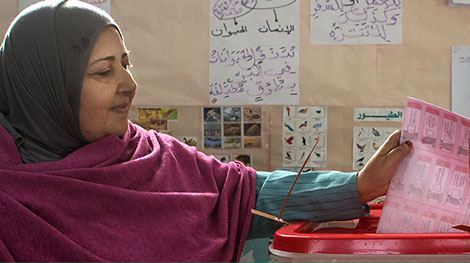 Building a peaceful world involves more than ending war. A peaceful world is one in which justice thrives, everyone’s rights are respected, and people have access to essentials. The Carter Center has dozens of programs and projects dedicated to making the dream of peace a reality. This slide show explores a handful of them.
Learn more »
Building a peaceful world involves more than ending war. A peaceful world is one in which justice thrives, everyone’s rights are respected, and people have access to essentials. The Carter Center has dozens of programs and projects dedicated to making the dream of peace a reality. This slide show explores a handful of them.
Learn more »
By Ambassador (ret.) Mary Ann Peters, chief executive officer
At The Carter Center, we believe people can improve their own lives when they have the right skills, knowledge, and access to resources. I’d like to introduce you to a few people who are making a real difference in their communities. Learn more »
Reverend Esther Ibanga is the senior pastor of Jos Christian Missions International and the president and founder of Women Without Walls Initiative (WOWWI), an organization established to address the persistent ethno–religious conflicts in Plateau state. Under her leadership, WOWWI has provided a platform for women across different ethnic and religious groups to activate their voices in the call for peace. Learn more »
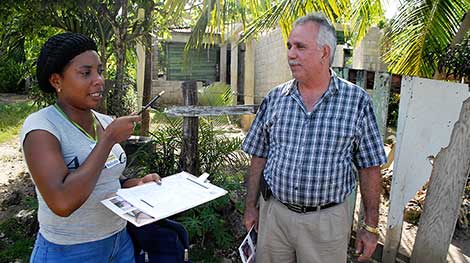 Helping is in Dr. Manuel Gonzales’ nature. It’s not just what he does; it’s who he is. “My vocation is to help people and help my country,” said Gonzales, who became the national manager of the Dominican Republic’s successful Lymphatic Filariasis Elimination Program in April 2001.
Learn more »
Helping is in Dr. Manuel Gonzales’ nature. It’s not just what he does; it’s who he is. “My vocation is to help people and help my country,” said Gonzales, who became the national manager of the Dominican Republic’s successful Lymphatic Filariasis Elimination Program in April 2001.
Learn more »
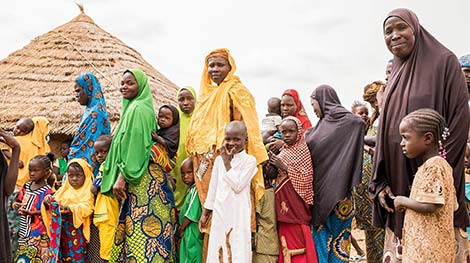 It’s good to distribute medicine that helps people avoid a painful, potentially blinding eye disease. It’s even better when that medicine also helps keep babies and children alive.
Learn more »
It’s good to distribute medicine that helps people avoid a painful, potentially blinding eye disease. It’s even better when that medicine also helps keep babies and children alive.
Learn more »
In case you missed “A Conversation with the Carters” on Sept. 11 at The Carter Center, an archived version of the webcast can be viewed below. Learn more »
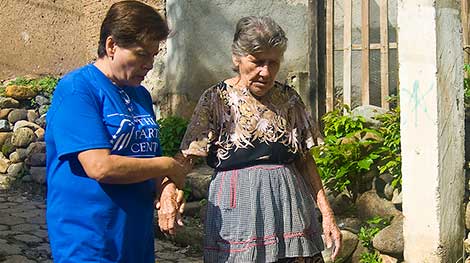 Information has the power to transform lives. But only if you can access it. In 2014, the Carter Center’s Global Access to Information program conducted a study that found that women in Guatemala have a harder time than men accessing information to which they’re entitled. This includes information about things that could make enormous differences in their lives – information about government benefit programs, about laws that protect them, about business and educational opportunities.
Learn more »
Information has the power to transform lives. But only if you can access it. In 2014, the Carter Center’s Global Access to Information program conducted a study that found that women in Guatemala have a harder time than men accessing information to which they’re entitled. This includes information about things that could make enormous differences in their lives – information about government benefit programs, about laws that protect them, about business and educational opportunities.
Learn more »
Meet Penda Mbaye, program manager for Tostan in Senegal, where the international nonprofit works to empower women and girls and create positive social change. As an attendee of the Carter Center’s Human Rights Defenders Forum, Mbaye shared her expertise in human rights education and community outreach. Learn more »
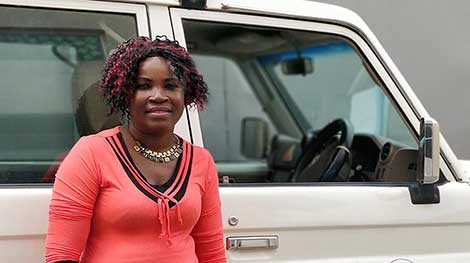 Theodosia Borbor may not be a lawyer, but she knows Liberian law. And she’s passionate about making sure others do, too. Borbor is a community justice advisor with the Carter Center-supported Catholic Justice and Peace Commission. She provides free mediation services and organizes community awareness sessions for the people of Margibi County, which sits about an hour from Liberia’s capital, Monrovia.
Learn more »
Theodosia Borbor may not be a lawyer, but she knows Liberian law. And she’s passionate about making sure others do, too. Borbor is a community justice advisor with the Carter Center-supported Catholic Justice and Peace Commission. She provides free mediation services and organizes community awareness sessions for the people of Margibi County, which sits about an hour from Liberia’s capital, Monrovia.
Learn more »
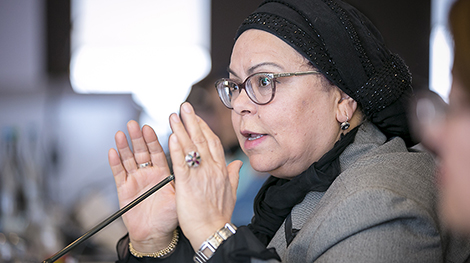 Mongia Nefzi Souahi, a professor at Zitouna University in Tunisia, knows what draws young people to violent extremism. She spent much of the past year trying to insulate 100 at-risk young people in the town of Kasserine – which CNN has called “the Tunisian town where ISIS makes militants” – from the lure of jihadis.
Learn more »
Mongia Nefzi Souahi, a professor at Zitouna University in Tunisia, knows what draws young people to violent extremism. She spent much of the past year trying to insulate 100 at-risk young people in the town of Kasserine – which CNN has called “the Tunisian town where ISIS makes militants” – from the lure of jihadis.
Learn more »
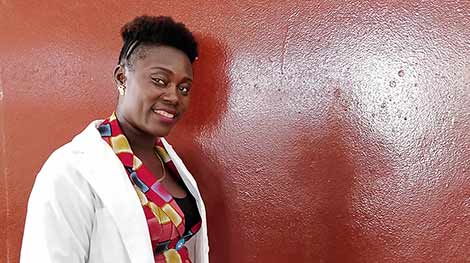 In the middle of bustling W.V.S. Tubman High School in Monrovia, Liberia, you’ll find a tranquil two-room oasis: the mental health clinic. Behind its metal door, which blocks out much of the cacophony from the open-air halls, students talk to mental health clinician Leah D.T. Sorboh about problems major and minor. Some of the teens’ complaints echo those of their counterparts around the world – they talk about breakups and mean teachers and difficult tests.
Learn more »
In the middle of bustling W.V.S. Tubman High School in Monrovia, Liberia, you’ll find a tranquil two-room oasis: the mental health clinic. Behind its metal door, which blocks out much of the cacophony from the open-air halls, students talk to mental health clinician Leah D.T. Sorboh about problems major and minor. Some of the teens’ complaints echo those of their counterparts around the world – they talk about breakups and mean teachers and difficult tests.
Learn more »
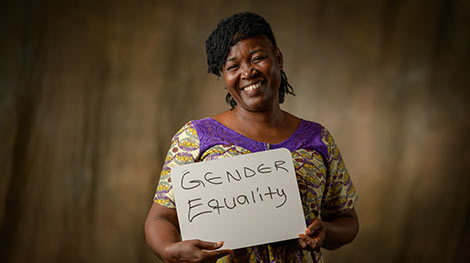 In July 2018, The Carter Center brought together nearly 70 activists, peacemakers, and religious and community leaders from around the world for the Carter Center’s annual Human Rights Defenders Forum to discuss “Restoring Faith in Freedom.”
Learn more »
In July 2018, The Carter Center brought together nearly 70 activists, peacemakers, and religious and community leaders from around the world for the Carter Center’s annual Human Rights Defenders Forum to discuss “Restoring Faith in Freedom.”
Learn more »
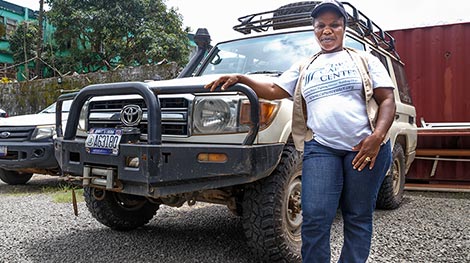 The 40-year-old mother of four is the first female driver for the Carter Center’s Access to Justice Project in Liberia – and one of the country’s few female professional drivers, period.
Learn more »
The 40-year-old mother of four is the first female driver for the Carter Center’s Access to Justice Project in Liberia – and one of the country’s few female professional drivers, period.
Learn more »
By Ambassador (ret.) Mary Ann Peters, chief executive officer
It’s no secret that this world is full of problems—some big and terrifying, some small and trivial. It may seem overwhelming at times, but it doesn’t have to be paralyzing. Learn more »
 Kate Orji grabs a tall measuring stick and large black plastic bag before heading across her front yard and through the gate of her family’s compound. It’s midday in this southern Nigeria community, and the air is hot and sticky. Orji knocks on her neighbor’s door and explains why she’s here, unpacking her bag to reveal two logbooks, a flipbook, two drug bottles, a spoon, and a pen.
Learn more »
Kate Orji grabs a tall measuring stick and large black plastic bag before heading across her front yard and through the gate of her family’s compound. It’s midday in this southern Nigeria community, and the air is hot and sticky. Orji knocks on her neighbor’s door and explains why she’s here, unpacking her bag to reveal two logbooks, a flipbook, two drug bottles, a spoon, and a pen.
Learn more »
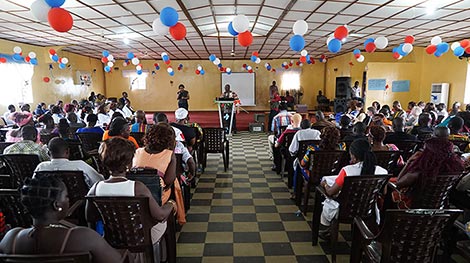 Eve Byrd remembers a conversation she had with a nursing student in Liberia several years ago. A faculty member for a Carter Center program to credential nurses for mental health disorders, Byrd and her student nurse had just finished seeing a patient and were discussing the case.
Learn more »
Eve Byrd remembers a conversation she had with a nursing student in Liberia several years ago. A faculty member for a Carter Center program to credential nurses for mental health disorders, Byrd and her student nurse had just finished seeing a patient and were discussing the case.
Learn more »
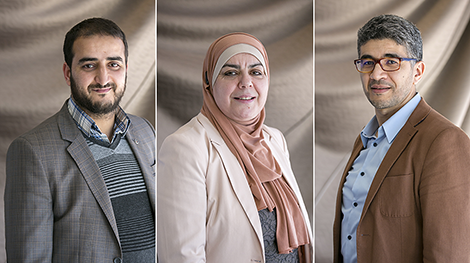 In 2014, The Carter Center launched what is now called the Inclusive Approaches to Preventing Violent Extremism Project. Staff first conducted an in-depth analysis of Daesh’s recruitment propaganda and then began training religious and community leaders to develop messaging to counteract extremist propaganda in all forms, whether it comes from Daesh or Islamophobic hate groups.
Learn more »
In 2014, The Carter Center launched what is now called the Inclusive Approaches to Preventing Violent Extremism Project. Staff first conducted an in-depth analysis of Daesh’s recruitment propaganda and then began training religious and community leaders to develop messaging to counteract extremist propaganda in all forms, whether it comes from Daesh or Islamophobic hate groups.
Learn more »
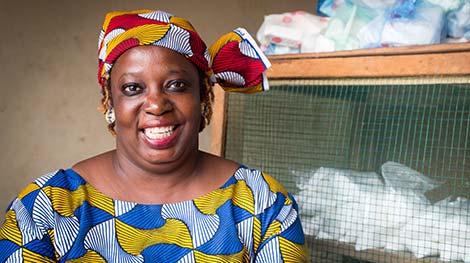 Sometimes, something as simple as a radio message can change lives. Olivia Stewart, a resident of New Georgia Estate, a mostly low-income community on the outskirts of Liberia’s capital city of Monrovia, was washing up one afternoon in 2015 when she heard a public notice for government grants for projects empowering women and youth.
Learn more »
Sometimes, something as simple as a radio message can change lives. Olivia Stewart, a resident of New Georgia Estate, a mostly low-income community on the outskirts of Liberia’s capital city of Monrovia, was washing up one afternoon in 2015 when she heard a public notice for government grants for projects empowering women and youth.
Learn more »
To extend the reach of their stories and maintain relevance in a world of spinning news cycles, journalists today often have mandates to create social media accounts and share a weekly quota of posts on them. But for Jaclyn Cosgrove, a 2015-16 recipient of the Rosalynn Carter Fellowship for Mental Health Journalism, social media means more than just posting her story. Learn more »
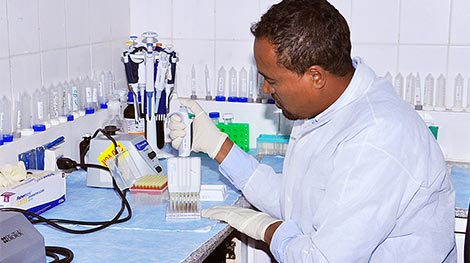 Ethiopia is serious about eliminating river blindness and has the laboratory to prove it. The laboratory, in Addis Ababa, opened in October 2015 as the Ethiopia Ministry of Health shifted from merely seeking to control the disease, technically called onchocerciasis, to trying to eliminate it entirely.
Learn more »
Ethiopia is serious about eliminating river blindness and has the laboratory to prove it. The laboratory, in Addis Ababa, opened in October 2015 as the Ethiopia Ministry of Health shifted from merely seeking to control the disease, technically called onchocerciasis, to trying to eliminate it entirely.
Learn more »
A landmark study in which The Carter Center is participating could radically change the public health model in the developing world, experts say. Learn more »
Malaria, a potentially deadly disease, with its fevers, aches, and extreme fatigue, definitely is not cool. But a music video featuring a great dance beat and a team of top Haitian performers? Now that’s cool! Learn more »
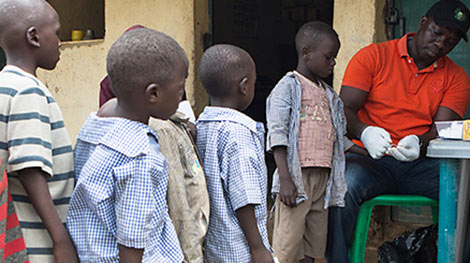 Herded outdoors by their teachers, bright-eyed children chatter, their blue-and-white school uniforms gleaming in a sharp but wiggly queue. Their excitement ebbs just a bit when they reach the front of the line and get a finger pricked by an adult wearing surgical gloves.
Learn more »
Herded outdoors by their teachers, bright-eyed children chatter, their blue-and-white school uniforms gleaming in a sharp but wiggly queue. Their excitement ebbs just a bit when they reach the front of the line and get a finger pricked by an adult wearing surgical gloves.
Learn more »
Last year, a Liberian woman named Beatrix decided she wanted to run for a seat in Liberia’s House of Representatives. But when she told her husband of her plan, he told her that she couldn’t, because she was a woman. Learn more »
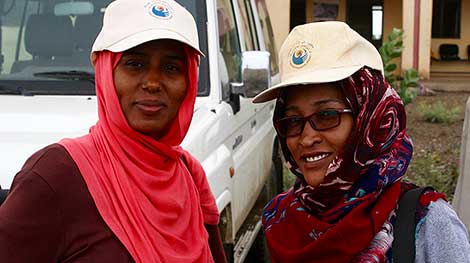 Even in the shade it was 105 degrees Fahrenheit. It can be challenging to focus in that kind of heat, but Dr. Saisabil Omer and Dr. Mayasa Mustafa were committed to providing sight-saving surgery to the men and women who came to the trachoma clinic in Al Fashaga, Gedarif state, Sudan.
Learn more »
Even in the shade it was 105 degrees Fahrenheit. It can be challenging to focus in that kind of heat, but Dr. Saisabil Omer and Dr. Mayasa Mustafa were committed to providing sight-saving surgery to the men and women who came to the trachoma clinic in Al Fashaga, Gedarif state, Sudan.
Learn more »
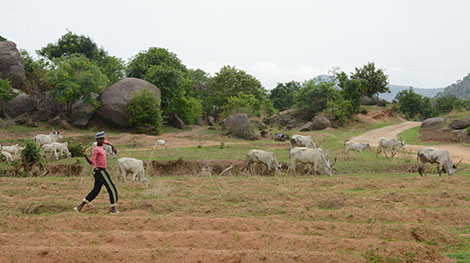 Meet some elders of Kisanchi village in central Nigeria. They are blind or have low vision due to river blindness, a parasitic infection that can cause intense itching, skin discoloration, rashes, and eye disease that often leads to permanent blindness.
Learn more »
Meet some elders of Kisanchi village in central Nigeria. They are blind or have low vision due to river blindness, a parasitic infection that can cause intense itching, skin discoloration, rashes, and eye disease that often leads to permanent blindness.
Learn more »
In Feburary 2018, President Carter got candid about China in a guest lecture at Emory University. President Carter discussed factors that led to his decision to normalize U.S. relations with China in 1979. He also talks about a dinner conversation with President Deng Xiaoping that likely led to a surge of Christianity in China, now one of the world's leading producers of Bibles. Learn more »
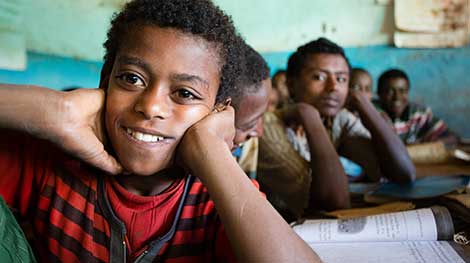 In 2018, The Carter Center is marking 20 years of impact against trachoma, the world’s leading cause of preventable blindness.
Learn more »
In 2018, The Carter Center is marking 20 years of impact against trachoma, the world’s leading cause of preventable blindness.
Learn more »
By Kelly Callahan, director, Trachoma Control Program
Hard work for a good cause can be its own reward. It’s even better when you have results to show for it. In 2018 The Carter Center is marking 20 years of impact against trachoma, the world’s leading cause of preventable blindness. Learn more »
By Laura Neuman, director, Carter Center Global Access to Information Program
Access to information is a transformative human right. Enshrined in Article 19 of the Universal Declaration of Human Rights, access to information is foundational not just for the exercise of other rights, but also for economic empowerment and meaningful participation in public life. And yet, a large portion of the world’s population is unable to enjoy this right. Learn more »
For these boys, freedom from a disfiguring disease means freedom to pursue their dreams on the diamond. Angel Ciriaco and Rigoberto Bryan are best friends who live in San Pedro de Macoris, a province in the southeastern Dominican Republic. The two 16-year-olds like to talk about school, about girls, and most of all about baseball. Learn more »
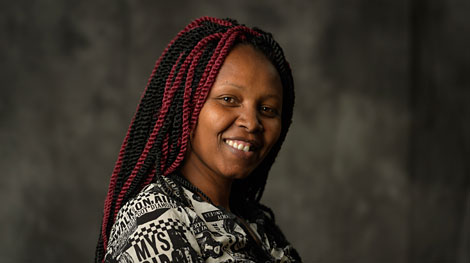 In Kenya in the early years of this century, young men in Nairobi’s Mathare slum were dying one by one at the hands of police and security officers. Sometimes it happened out of sight in custody, sometimes in broad daylight in the street. Other youths simply disappeared, their fates never determined.
Learn more »
In Kenya in the early years of this century, young men in Nairobi’s Mathare slum were dying one by one at the hands of police and security officers. Sometimes it happened out of sight in custody, sometimes in broad daylight in the street. Other youths simply disappeared, their fates never determined.
Learn more »
Play our puzzle! Find peace, health, and hope words in the Carter Center’s Word Search below. Learn more »
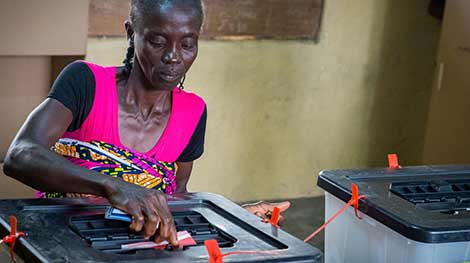 The year 2017 was a historic one for Liberia. “For the first time in most of their lives, Liberians saw power transfer from one democratically elected president to another,” said Jordan Ryan, vice president of the Carter Center’s peace programs. “This is something that hasn’t happened in Liberia since the 1940s. Other presidents were forced from power, died in office, or murdered in coups.
Learn more »
The year 2017 was a historic one for Liberia. “For the first time in most of their lives, Liberians saw power transfer from one democratically elected president to another,” said Jordan Ryan, vice president of the Carter Center’s peace programs. “This is something that hasn’t happened in Liberia since the 1940s. Other presidents were forced from power, died in office, or murdered in coups.
Learn more »
 At the heart of the River Blindness Elimination Program in Nigeria are thousands of community volunteers who receive training and equipment to serve as community-directed distributors. They deliver accurate health information to their neighbors, administer the medications that combat the disease, and keep thorough records for Ministry of Health and Carter Center researchers to track progress. Get to know some of these volunteers here.
Learn more »
At the heart of the River Blindness Elimination Program in Nigeria are thousands of community volunteers who receive training and equipment to serve as community-directed distributors. They deliver accurate health information to their neighbors, administer the medications that combat the disease, and keep thorough records for Ministry of Health and Carter Center researchers to track progress. Get to know some of these volunteers here.
Learn more »
Healing from trauma sometimes goes beyond individual therapy, journalist Emily Underwood reports. Underwood is helping readers understand that when an entire community experiences trauma, a kind of communal healing needs to take place as well. Learn more »
Please sign up below for important news about the work of The Carter Center and special event invitations.